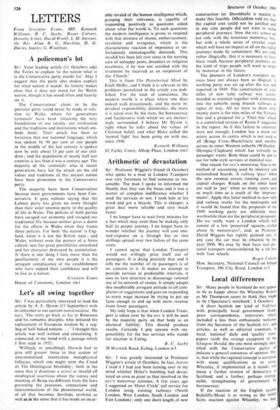Arithmetic of devastation
Sir : Professor Wiggins's friend (4 October) who spoke to a man at London Transport was very fortunate to find someone so rea- sonable. The man I spoke to informed me bluntly that they ran the buses and it was a matter of complete indifference whether I used the services or not. I took him at his word and got a bicycle. This is cheaper, a great deal more reliable and very much faster.
I no longer have to wait forty minutes for a bus which may even then be making only half its proper journey. I no longer have to wonder whether the journey will cost one- and-sixpence on a through bus or two shillings spread over two halves of the same route.
I cannot agree that London Transport would not willingly price itself out of passengers. It is doing precisely that and it tells me the number of its passengers is of no concern to it. It makes no attempt to provide services at predictable intervals, it uses its fare structure to discourage rational use of its network of routes. It simply adopts this insufferably arrogant attitude to all com- plaints or suggestions and goes on responding to every wage increase by trying to put up fares enough to end up with more revenue from fewer passengers.
My only hope is that when London Trans- port is taken over by the GLC it will be seen by the majority party on that body as an electoral liability. This should produce results. Certainly I pity anyone with res- ponsibility for the bus services who stands for election in Ealing.
R. C. Saxby 38 Warwick Road, Ealing, London w5
Sir: I was greatly interested in Professor Wiggins's article (4 October). In fact, before I read it I had' just been turning over in my mind whether Hitler's bombing had devas- tated an area as great as that involved in the GLC'S motorway schemes. A few years ago I suggested an 'Outer Circle' rail service for London using existing railways (North London, West London, South London and East London) ; only one short length of new construction (at Shoreditch) is needed to make this feasible. Officialdom told me that the capital cost could not be justified and in any case people did not want to make peripheral journeys. Now the GLC comes up not only with the notorious motorway box, but with a whole series of circular roads which will have no impact at all on the radial journeys made by commuters. We are told, rather illogically, that it is necessary to have these roads because peripheral journeys are the kind of trips people will want to make by motorcar in the future.
The planners of London's transport ser- vices have not always been so illogical. A working party was set up after the war and reported in 1949. The construction of sixty miles of new tube railway was recom- mended as essential together with extensions into the suburbs using branch railways as rights of way. All we have to show after twenty years is the nine miles of the Victoria line and a proposal for a 'Fleet line' which is a constricted version of Route F suggested in the report. As if this failure to construct were not enough, London has a main rail artery across its centre which is not used at all (Kings Cross/Blackfriars) and another across its inner Western suburbs (Willesden/ Olympia/Clapham) which has virtually no passenger trains. Both these could be put to use for tube-style services at minimal cost.
One reason for °Lc's motorway bias is the method of accounting used by ministry and nationalised boards. A railway 'pays' when the new revenue covers running costs and capital charges. Roads on the other hand are said to 'pay' when so many users save so much time as a result of the 'improve- ments'. Apply this latter method to new tube and railway works for the metropolis and it would be found that the proposals of the 1949 working party are infinitely more worthwhile than are the peripheral proposals. Do we really want a London which will consist of a few 'preserved' squares circled about by motorways?, and, as Professor David Wiggins has rightly pointed out, in any case the car may be obsolete by the year 2000. We may by then have real per- sonal transport unencumbered by a tin box with four wheels.
Roger Calvert Hon. Secretary, National Council on Inland Transport, 396 City Road, London Ecl


































 Previous page
Previous page